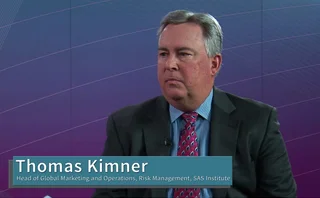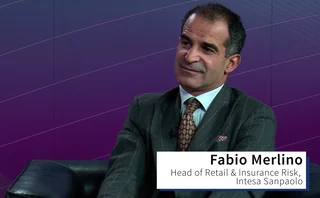
Reuters FX under threat
Reuters is fighting back to secure its position in FX, following the announcement of an alliance between two rivals, reports Risk's sister publication FX Week .
The deal brings EBS Trader, now used by 2,400 dealers, to a potential 170,000 desktops, and gives Bloomberg the ready-made direct-dealing product it needs to pursue its long-planned push into forex.
Reuters, however, was quick to respond to the threat last week. "Reuters is ready for the EBS-Bloomberg link-up, which is not unexpected," said Julie Holland, managing director of Reuters Treasury Services in London. "We will carry on doing what we do. Bloomberg has been unsuccessful in taking market share from us in foreign exchange in the past, and EBS has not taken any of our market share in conversational dealing. You need critical mass to have a conversational dealing product - probably 10,000 users."
Holland said Reuters responded to the "potential threat" of EBS Trader at its launch 18 months ago, with the development of Reuters Dealing Link, its own lower functionality, lower price offering. That has 1,000 users now, in addition to the 18,000 using Reuters’ conversational product.
While EBS controls the bulk of spot interbank broking in the three highest volume currency pairs - euro/dollar, dollar/yen and euro/yen, Reuters has wider coverage of currency pairs, with 34, and maintains its hold on the sterling market.
Yet, for EBS, the Bloomberg deal is exactly the way it hopes to challenge Reuters’ wider distribution. And, as elsewhere in forex, as volumes - and profits - grow in emerging markets, that market offers perhaps the greatest growth potential.
"We need wider visibility in emerging markets," explained Jack Jeffery, chief executive of EBS in London. "It’s critical for us to be in all currency pairs."
In that respect, Bloomberg should deliver. "We recently did an audit of where we have desktops in forex," said Andrew Hausman, global head of electronic foreign exchange trading, energy, and exchange-traded derivatives at Bloomberg in New York. "We were surprised to see our market share is strongest in emerging markets. We found that the percentage of people we might be in front of is higher than in New York or London. We already have the infrastructure in some pretty difficult places. It makes EBS Trader a more viable competitor."
Another advantage of bringing EBS onto Bloomberg screens in emerging markets is that here, "one-stop shopping" is more relevant, said Hausman, because clients don’t have the infrastructure to build "piecemeal". In that context, bringing an established forex dealing system to the fixed-income and equities screens of Bloomberg would be a compelling move. In major markets, the one-stop shop has growing appeal at a time when many banks are realigning forex and fixed-income desks to work more closely together in the name of "cross-product" sales.
The deal could also prove significant in bringing EBS to Bloomberg’s buy-side clients -- another growing area of the industry, as volumes in inter-bank forex decline overall. "We intend to offer EBS Trader to corporates and investors," confirmed Jeffery last week, in the firm’s first admission that buy-side clients could be major users of EBS Trader. EBS, being bank-owned, has previously been reluctant to explicitly target the clients of its owners. But, said Jeffery last week: "It’s necessary for us to go into that market-place. Our bank owners are very supportive of this initiative."
Bloomberg has been expanding its coverage of the FX market in recent years, with more pricing sources from banks, more reporters for the news service and improved analytics, said Bloomberg’s Hausman. Having identified a "number of holes" in the forex strategy -- notably a direct- dealing product for forex ("we didn’t have one"), and some market data ("we needed a broker or exchange"), he said it became clear EBS was "the perfect partner to fill our needs. We see forex as a growth area, and at the centre of this is the EBS arrangement."
Only users who have a paid subscription or are part of a corporate subscription are able to print or copy content.
To access these options, along with all other subscription benefits, please contact info@risk.net or view our subscription options here: http://subscriptions.risk.net/subscribe
You are currently unable to print this content. Please contact info@risk.net to find out more.
You are currently unable to copy this content. Please contact info@risk.net to find out more.
Copyright Infopro Digital Limited. All rights reserved.
As outlined in our terms and conditions, https://www.infopro-digital.com/terms-and-conditions/subscriptions/ (point 2.4), printing is limited to a single copy.
If you would like to purchase additional rights please email info@risk.net
Copyright Infopro Digital Limited. All rights reserved.
You may share this content using our article tools. As outlined in our terms and conditions, https://www.infopro-digital.com/terms-and-conditions/subscriptions/ (clause 2.4), an Authorised User may only make one copy of the materials for their own personal use. You must also comply with the restrictions in clause 2.5.
If you would like to purchase additional rights please email info@risk.net
More on Infrastructure
Communications surveillance solutions 2024: market update
A report offering Chartis’ latest view of the vendor landscape for communications surveillance solutions
SIMONE, the AI that nearly took down a bank
An algorithm designed to create new structured products ran out of control last year with almost catastrophic consequences for a major bank, as our exclusive whistleblower account reveals
Revealed: where banks are (literally) warehousing their swaps
As derivatives notional grows, dealers experiment with novel storage solutions
E-trading takes hold for FX swaps – sort of
Bulk of trades are being executed over screen, but bolder changes have stalled
From DNA to DHA – Preparing for a new era of digital human augmentation
As technology increasingly permeates societies, cultures and everyday activities, its integration into people’s lives is having a profound impact on what is expected of people in the workplace. Deloitte examines this evolution of today’s workforce, the…
Risk and finance: Working more closely together
Video interview: Thomas Kimner, SAS
Video interview: Fabio Merlino, Intesa Sanpaolo
Fabio Merlino, head of retail and insurance risk discusses how the wealth management division of Intesa Sanpaolo upgraded its risk analytics capabilities with the algo system used by its proprietary traders
The changing face of Risk.net and our magazines
Extensive reader consultation has helped us reshape editorial teams and our site







